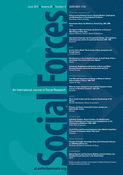-
Views
-
Cite
Cite
Stanislav Vysotsky, Urban Flow: Bike Messengers and the City By Jeffrey L. Kidder ILR Press. 2010. 240 pages. $27.95 cloth, Social Forces, Volume 93, Issue 4, June 2015, Page e102, https://doi.org/10.1093/sf/sos079
Close - Share Icon Share
Extract
The bike messenger, or courier, has become a fixture on the urban landscape of most global cities. Chaotically weaving through traffic, she is seen as either an anarchic urban cowboy or a severe public nuisance. In an age of instant communication and digital technology, this seemingly anachronistic profession thrives as a result of the demands for timely delivery of documents and page proofs in legal and creative professions. However, as Jeffrey L. Kidder explains in Urban Flow: Bike Messengers and the City, being a bike messenger involves more than a workplace identity. The courier represents a unique subcultural identity that blurs the lines between work and play in the late capitalist economy through what Kidder terms the “affective appropriation of space.”
This work is the product of Kidder's extensive ethnographic research into the subculture of messengers in three U.S. cities over a period of 5 years. His work began in New York, the city with the most working messengers in America, where he worked as a courier, followed by doing research in Seattle and San Diego, cities with smaller courier communities. The research is also supplemented with content analysis of Urban Death Maze, a New York-based courier fanzine and the New York Times. By fully immersing himself in the messenger subculture, Kidder is able to provide the unique perspective of a subculture that is often closed, if not entirely hostile, to outsiders. He attempts to answer the question “What is the lure of delivering packages?” (7) by presenting the reader with a detailed description of the job and subculture, an understanding of how messengers negotiate and interact with both public and private space, and a theory about how an occupation identity can become an essential part of an individual's identity.



